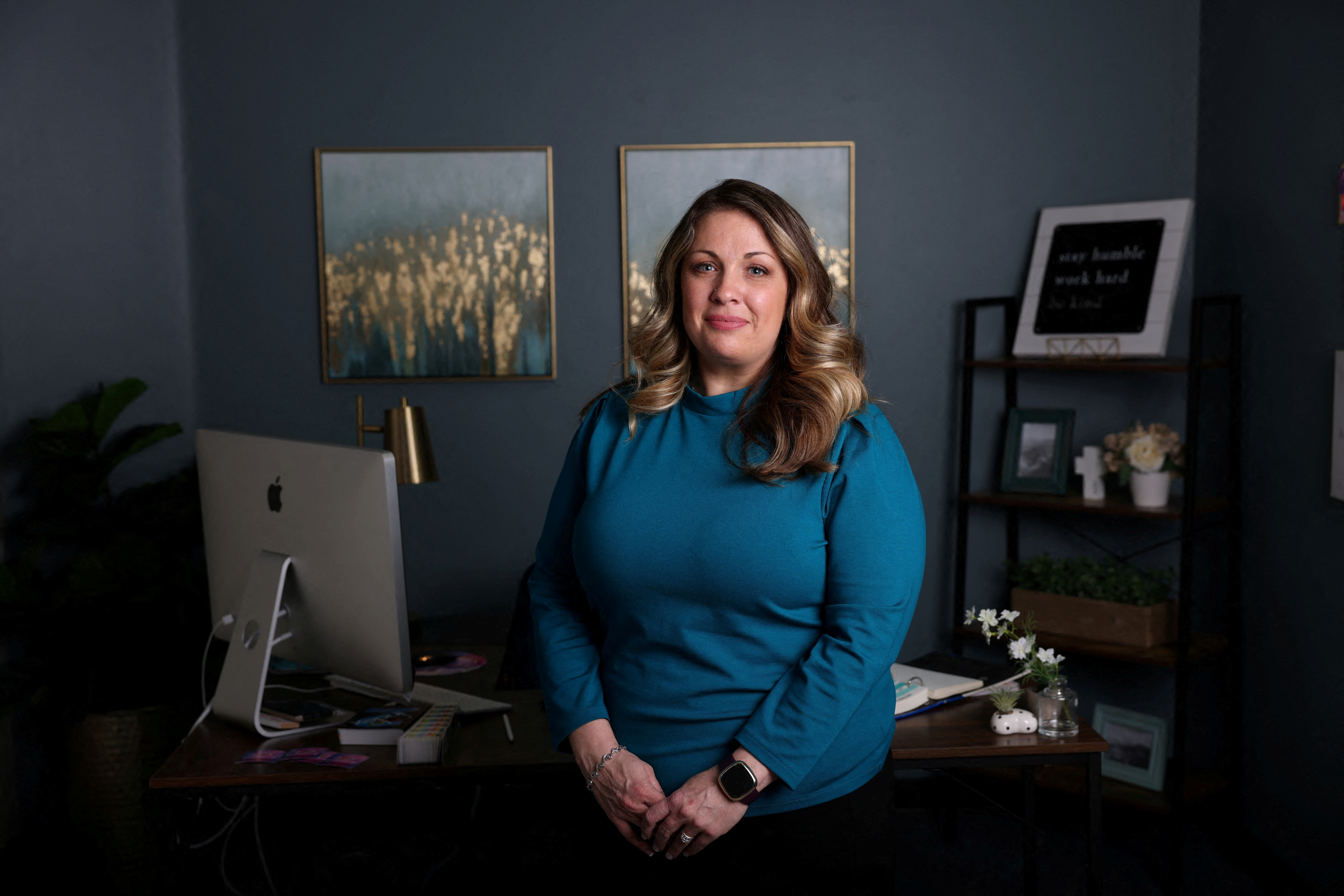US Supreme Court deals blow to LGBT rights in web designer case

Web designer Lorie Smith, plaintiff in a Supreme Court case who objects to same-sex marriage, poses for a portrait at her office in Littleton, Colorado, U.S., November 28, 2022. REUTERS/Kevin Mohatt/
In a blow to LGBT rights, the U.S. Supreme Court’s conservative majority on Friday ruled that the constitutional right to free speech allows certain businesses to refuse to provide services for same-sex weddings, a decision that the dissenting liberal justices called a “license to discriminate.”
The justices ruled 6-3 along ideological lines in favor of Denver-area web designer Lorie Smith, who cited her Christian beliefs against gay marriage in challenging a Colorado anti-discrimination law. The justices overturned a lower court’s ruling that had rejected Smith’s bid for an exemption from a Colorado law that prohibits discrimination based on sexual orientation and other factors.
Smith’s business, called 303 Creative, sells custom web designs, but she opposed providing her services for same-sex weddings.
Conservative Justice Neil Gorsuch wrote in the ruling that Colorado’s law would force Smith to create speech that she does not believe, in violation of the U.S. Constitution’s First Amendment.
“Were the rule otherwise, the better the artist, the finer the writer, the more unique his talent, the more easily his voice could be conscripted to disseminate the government’s preferred messages. That would not respect the First Amendment; more nearly, it would spell its demise,” Gorsuch wrote.
“The First Amendment envisions the United States as a rich and complex place where all persons are free to think and speak as they wish, not as the government demands,” Gorsuch added.
The court’s three liberal justices dissented. Justice Sonia Sotomayor wrote, “Today, the Court, for the first time in its history, grants a business open to the public a constitutional right to refuse to serve members of a protected class.”
Sotomayor added, “By issuing this new license to discriminate in a case brought by a company that seeks to deny same-sex couples the full and equal enjoyment of its services, the immediate, symbolic effect of the decision is to mark gays and lesbians for second-class status. In this way, the decision itself inflicts a kind of stigmatic harm, on top of any harm caused by denials of service.”
The decision by the court, on the final day of rulings in its term that began in October, comes at a time when laws targeting the rights of transgender and other LGBT people are being pursued by Republican legislators in numerous conservative-leaning states.
The case pitted the right of LGBT people to seek goods and services from businesses without discrimination against the free speech rights, as asserted by Smith, of artists – as she called herself – whose businesses provide services to the public.
President Joe Biden, a Democrat, criticized the ruling.
“In America, no person should face discrimination simply because of who they are or who they love,” Biden said in a statement, adding that he fears the ruling could invite more discrimination.
“More broadly, today’s decision weakens long-standing laws that protect all Americans against discrimination in public accommodations – including people of color, people with disabilities, people of faith and women,” Biden added.
The justices in recent years had backed LGBT rights in major cases, though the court has since moved rightward. A 2015 decision legalized gay marriage nationwide. A 2020 ruling found that a federal law barring workplace discrimination protects gay and transgender employees.
Public accommodations law
Smith, who lives in the Denver suburb of Littleton, is an evangelical Christian who has said she believes marriage is only between a man and a woman. She preemptively sued Colorado’s civil rights commission and other state officials in 2016 because she said she feared being punished for refusing to serve gay weddings under Colorado’s public accommodations law.
Smith called Friday’s ruling a victory for all Americans, adding, “Colorado can’t force me or anyone to say something we don’t believe.”
Sotomayor warned that the ruling could cause a ripple effect of discrimination, particularly since the case was decided on free speech grounds, rather than religious rights.
“A website designer could equally refuse to create a wedding website for an interracial couple, for example … A stationer could refuse to sell a birth announcement for a disabled couple because she opposes their having a child. A large retail store could reserve its family portrait services for ‘traditional’ families. And so on,” Sotomayor wrote.
Friday’s decision followed one in 2018 in which the justices ruled in favor of a Denver-area baker who refused based on his Christian views to make a wedding cake for a gay couple.
Public accommodations laws exist in many states, banning discrimination in areas such as housing, hotels, retail businesses, restaurants and educational institutions. Colorado first enacted one in 1885. Its current Anti-Discrimination Act bars businesses open to the public from denying goods or services to people because of race, gender, sexual orientation, religion and certain other characteristics.
Colorado argued that its Anti-Discrimination Act regulates sales, not speech, to ensure “equal access and equal dignity.” Smith thus is free to sell whatever she wants, including websites with biblical passages stating an opposite-sex vision of marriage.
Kelley Robinson, president of LGBT civil rights group Human Rights Campaign, called Friday’s decision “a deeply troubling crack in our progress and should be alarming to us all.”
READ: Gay marriage, other rights at risk after US Supreme Court abortion move